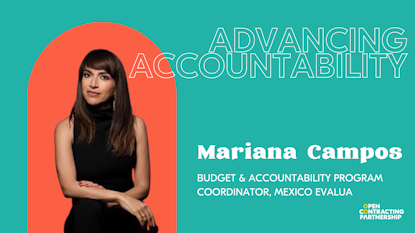2022 Open Contracting Champion: Mariana Campos

What has been your proudest moment or achievement in building accountability or transparency into government?
One proud moment for me was when the Infraestructura Abierta project launched thanks to the investment of many different stakeholders who made it grow, including Mexico’s National Institute of Transparency (INAI). INAI’s commitment was key, since it strengthened the platform and made it possible for more governments to participate. We started with Nuevo León’s state government back in 2018, and today we are working with more than 20 governments, organized in 10 working groups at the state level, and we have over 20 public entities uploading data on their platforms. And we have not stopped receiving requests from new interested parties. Nuevo León now has more than 10 municipalities working with Infraestructura Abierta.
For your fellow open contracting champions out there—what is the #1 piece of advice you would share with a reformer working to increase accountability, transparency, or participation in government?
You have to design a strategy—reforms do not happen naturally or spontaneously. A few of my strategy tips:
- Build knowledge on what has to be done. You have to be the expert on the what, the why, and the how.
- Identify your stakeholders and inspire them with what can be achieved, together.
- Build a team around a common vision and goals, and listen to the interests, motivations, and fears of all members.
- Be responsible, accountable, and prepared to do the hard work!
What’s your go-to resource for building accountability in public procurement?
First, have a vision, and let yourself picture the outcome you want to achieve. Then build up your patience, since achieving impact takes years, and plans take unexpected turns that you will have to accommodate more times than expected. Finally, resilience is a must, as it will help you keep going towards your vision without giving up.
If public procurement was a sport, which one do you think it would be and why?
It would definitely be a soccer game. The two teams are the buyer and the contractor, and each one wants the game to turn out in their favor (this seems easy at first, but it is not, because scoring goals requires technique, timing, and strategy). The soccer referee is the regulator, or the institutions that monitor compliance with the rules and the decision-making instruments. The ref must understand the motivations of both teams so that he can call a fair game. The coaches and the International Football Federation (FIFA) are the CSOs giving recommendations to the players. OCP and its standards do the work of the broadcaster, making it easier for everyone to understand the game and see what went well or what went wrong. This work is very important because it builds up the fan base, a.k.a. the public, and encourages everyone to become more aware of what happens in the soccer game, or the public contracts.